-
Open Roads: New Italian Cinema At Lincoln Center 2023
Open Roads: New Italian Cinema At Lincoln Center 2023
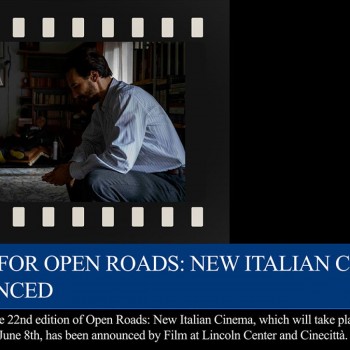
GENERAL FILM FORUM THREAD
LINKS TO REVIEWS:
Chiara (Susanna Nicchiarelli, 2022)
Delta (Michele Vannucci, 2022)
Dry/Siccità (Paolo Virzì, 2022)
Fireworks/Stranizza d'amuri (Giuseppe Fiorello, 2023)
Hummingbird, The/Il Colibrì (Francesca Archibugi, 2022) OPENING FILM
Like Turtles/Come le tartarughe (Monica Dugo, 2022)
Lord of the Ants/Il signore delle formiche (Gianni Amelio, 2022)
Margins/Margini (Niccolò Falsetti 2022)
My Summer with the Shark/Denti da squalo (Davide Gentile, 2023) WORLD PREMIERE
Princess (Roberto De Paolis, 2022)
Strangeness/La stranezza (Roberto Andò, 2022)
Leopardi/Leopardi: il giovane favoloso (Mario Martone, 2014)
Nostalgia (Mario Martone, 2022)
Troubling Love/L'amore molesto (Mario Martone, 1995)
Last edited by Chris Knipp; 06-07-2023 at 09:15 PM.
-
THE HUMMINGBIRD/IL COLIBRÌ (Francesca Archibugi 2022)
FRANCESCA ARCHIBUGI: THE HUMMINGBIRD/IL COLIBRÌ (2022)
OPENING NIGHT FILM

BÉATRICE BEJO, PIERFRANCESCO FAVINO IN THE HUMMINGBIRD
A swirling tale of unfulfillment
The opening-night screening of the Open Roads: New Italian Cinema series for 2023 in New York is Francesca Archibugi’s latest feature The Hummingbird/Il colibrì. It is a film adapted from Sandro Veronesi’s Strega Prize-winning novel, described in the festival blurb as "an at once epic and intimate chronicle of love and familial ups and downs that spans six decades and three generations," and it features Pierfrancesco Favino, Bérenice Bejo, Laura Morante, Nanni Moretti, and others, notably the Polish-born Kasia Smutniak as Marina Molitor, a fiery, in fact crazy, Balkan former airline hostess who is the wife of Marco Carrera, the protagonist played by Favino.
This is a film that is fascinating but ultimately disappointing. A Spanish critic is quoted as saying it's "easy to follow." That was more a boast than a statement. It jumps back and forward in time over a half century in the lives of Marco, the crazy Balkan wife, and Marco's longtime platonic love from next door Luisa Lattes, played as an adult by Bejo. Nanni Moretti appears early on presenting himself to Marco, a doctor, as Carradori, Marco's wife's psychiatrist, to tell him he is "in great danger." We don't find out why. He has come to question Marco about his long time love affair, or love for, Luisa Lattes. We don't find out why he does that either. But this introduces the movie's main thread. The film also depicts Marco's relationship with his daughter Adele and his granddaughter Mirajin. Later in life he explores a hitherto unexpected talent for gambling in high-stakes poker games. Carradori will continue to reappear as he and Marco are provided with gray hair and wrinkles to designate later times in their lives. Acres of aging makeup and prosthetic wrinkles have been distributed among cast members for the later-stage scenes.
Sandro Veronesi's source novel won the coveted Strega literary prize, which more than explains why Archibrugi''s film came into existence. Literary prizes loom large in Italy as in France, and this is like the Booker Prize in England, only more so, in addition to which Veronesi has won two of them. I looked up two reviews of the novel. The Guardian one says it is everything wonderful that fiction can be. The Kirkus review is far more skeptical, saying it is "an intriguing but ultimately disappointing experiment in fictional biography." The Kirkus review also reveals that in the book "We find out that Marco fell in love with Luisa when she was 13 and he was 20," and glosses over this troubling detail; it is eliminated in the film.
The novel uses multiple formats to tell its time-shifting story, third-person narrative, letters, dialogue, and other fragments. The film simply makes rapid shifts: you may experience whiplash. It's helped that someone has been found who looks very much like Favino as a young man. It's not so hard to recognize Marco and Luisa at different ages, just hard to see where the story is going.
What about the title? A peculiar detail is that Marco as a boy is small for his age. His father insists, over the objections of his mother (Laura Morante) on his being sent for growth hormone shots, which have a dramatic effect. Because of his small size he's called "the hummingbird." But later, Marina, in a moment when not smashing things and shouting, snidely says Marco is like a hummingbird because he spends all his effort to stay in one place. She finds him stagnated.
Not a flaw of this film, which is in constant motion. But in the end not much that matters to us really happens. This winds up being a glossy but unrewarding watch, which Italian reviews have noted is another elaborate portrait of the Italian upper bourgeoisie. Marco's family is wealthy; so is that of their neighbors to whom Luisa Lattes belongs. When all else failed I enjoyed looking at the handsome, spacious rooms and the large abstract paintings in the mature Marco's house, which are very nice.
Pierfrancesco Favino is the new Italian cinematic everyman, notably seen as Tommaso Buscetta, the Sicilian mobster turned state's witness, in Bellocchio's 2019 The Traitor, and the expatriate who returns to Naples after forty years in Mario Martone's 2022 Nostalgia, where his performances define the kind of solid, restrained soulfulness that he also displays here. He is not suave and handsome like earlier Italian leading men but there is something deeply comforting and watchable about him. One Italian critic says he "cannibalizes" The Hummingbird. Perhaps so. But this dominance helps keep the film from being completely scattered. Nonetheless apart the Balkan wife's explosions and Bejo's soulful objections to her longtime platonic lover Marco's excessive restraint - he says this keeps them from hurting anybody but she asks "What about us?" - there is a paucity of emotional depth and a damning failure to get to the bottom of any of the personalities. This is a danger of storytelling that is constantly shifting about. Complicated storytelling may impress, especially with a lot of good actors and beautiful mise-en-scène, but it is rarely storytelling that ultimately satisfies.
The Hummingbird/Il colibrì, 126 mins., debuted at Toronto Sept. 2022, also opening at Rome Oct. 2022, released theatrically in Italy Oct. 14, 2022. Screened for this review as part of the Open Roads: New Italian Cinema June 1-8, 2023 series at Lincoln Center (with Cinnecittà) where it was also the opening night film.
Thursday, June 1 at 7:00pm (Q&A with Francesca Archibugi)
Wednesday, June 7 at 6:00pm
Last edited by Chris Knipp; 05-29-2023 at 11:55 AM.
-
DELTA (Michele Vannucci 2022)
MICHELE VANNUCCI: DELTA (2022)
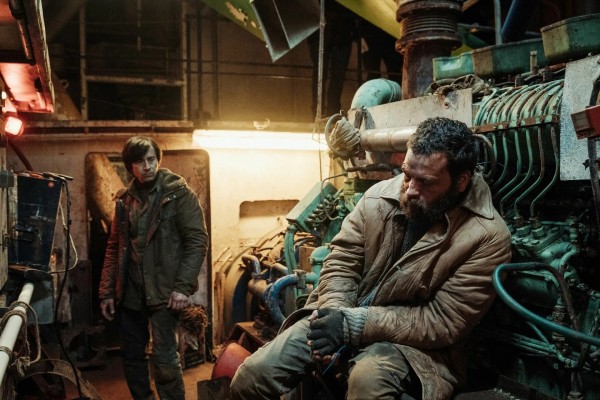
LUIGI LO CASCIO, ALESSANDRO BORGHI IN DELTA
Local conflicts end in a one-on-one duel
Locarno, home of the wild and offbeat, was the kickoff spot for this rough Italian noir-western set in the Po Valley of two men who clash. Delta is an earnest semi-documentary actioner, but at times it's messy and silly. Adults giggle, grab, and fall over each other at play. But there is committed acting here and dp Matteo Vieille does a lot to make it real. Maybe the genre and earnest contemporary elements don't clash, though to spin them out fully it's true, as suggested by reviewer Maria Braga, this could work better as a miniseries.
The region as seen here is gray, wet, and an eco-disaster. Big companies have been dumping waste. Big dead fish turn up. Poachers sneak in by night, use electric shock to kill fish. Old photos are all that remains to show a time of locals who legally and properly made a living fishing here and the area was not in turmoil.
A bear of a man called Elia (Alessandro Borghi), always an outsider, now lives with Romanians who poach fish illegally using electric shock. The opening scene is tight on Elia, his broad back wrapped in a striking decorated coat with a picture woven on the back, very alone, rowing in a boat in the tangled briar-infested wetland while a helicopter hovers menacingly overhead looking for poachers like him. He isn't caught, and shock kills dozens of fish: a drone shot looks down on Elia in his boat surrounded by floating dead fish.
Osso (Luigi Lo Cascio, who has an interesting haggard boy look now) is an ardent local environmentalist and great stickler for hands-off, restrained enforcement of regulations. But things turn personal for him when it develops that his ex-girlfriend Anna (Emilia Scarpati Fanetti) is now connected to none other than Elia. But Osso is also in conflict with locals (and perhaps the carabinieri) who warn him his concern with the chemical waste is out of date, the bigger problem now is the foreigners. (Are they Romanians?) indeed, in this physically and emotionally violent melodrama, they defend their forest-wetland lair as their private domain, violently.
All these geopolitical and sociological conflicts fade into the background when the second half of the film turns into a desperate one-on-one struggle between Elia, fleeing carabinieri and people, and Osso, who tracks him down to avenge a terrible wrong done to him. It's off and on, sometimes over the top, but magnificent use is made of the rich foggy, soggy settings of river, wetland, and bramble. Vanucci deserves credit for his vivid use of the Po setting.
Delta, 105 mins., a Grøenlandia production that premiered at Locarno Aug. 7, 2022, also showing at half a dozen other festivals. It has done poorly at the Italian box office since its March 23, 2023 release, says Quinlan. Screened for this review as part of the Open Roads: New Italian Cinema June 1-8, 2023 series at Lincoln Center (with Cinnecittà)
Sunday, June 4 at 2:30pm (Q&A with Michele Vannucci)
Tuesday, June 6 at 3:00pm
Last edited by Chris Knipp; 06-05-2023 at 08:15 AM.
-
Chiara (Susanna Nicchiarelli 2022)
SUSANNA NICCHIARELLI: CHIARA (2020
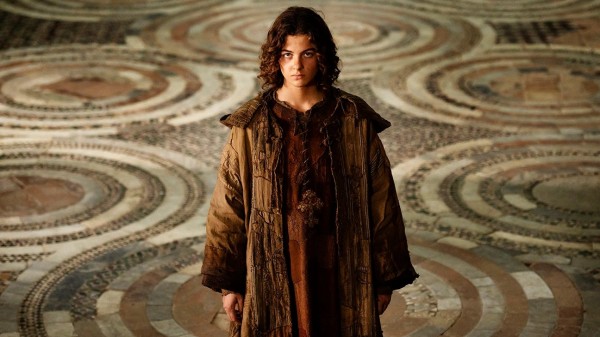
MARGHARITA MAZZUCCO IN CHIARA
A female counterpoint of Francis of Assisi
This modern take on an early thirteenth-century Italian saint, a contemporary and associate of Francis of Assisi, features the star of My Brilliant Friend, Margherita Mazzucco. It's free about facts, also off-putting, or, if it's to your taste, enlivening, with its use of staring into the camera fourth-wall-breaking moments and interpolated musical numbers, which are like livened-up Gregorian chants with a pop flavor; also moments when the screen goes black (why are current filmmakers so fond of dark screens?) Despite the attention-getting effects, it has charm and it tells a good story, especially of Chiara's relationship with Saint Francis, his triumph over illness and his wonderful prayer.
This takes place around Assisi, using the real sites, and Chiara leaves her family to serve a hippieish, sweet and toweringly cute Saint Francis, played by Andrea Carpenzano, who five years ago was one of the budding mafiosi assassins in the D'Innocenzo brothers' Boys Cry and is quite striking here. This is at first a setback for Chiara, because Francis paternalistically sends her and her girlfriend to a convent where they are put to work as scullery maids - not what she had in mind at all. She breaks away from that, and fights off a sadistic uncle and has her own group of poorly dressed, bare-headed followers. Chiara starts performing miracles, in which she often surprises herself, and gathers sisters who include the motherly Cristiana (Carlotta Natoli),and the middle-aged Balvina (Paola Tiziana Cruciani), who has health issues. She asks for Vatican recognition of her order on a par with Francis' and Papal emissary Cardinal Ugolino (Luigi Lo Cascio) is sent to check up.
Ugolino says no woman can set an example for anything and women can't travel or take a vow of poverty. Lo Cascio adds a note of colorful medieval glitz, and turns into the new pope, Gregory IX, returning dressed in a tent-like robe of bright blue for spring and riding a white horse and with attendants in bright yellow. Nichiarelli delights in such theater as well as oddball moments, like breaks to discuss cooking apropos of a miracle involving a jar of olive oil or Francis, who we learn loved to eat, enjoying a local delicacy on a trip to the holy land. The director keeps the nuns very austere, but still surprises audience expectations frequently. The emphasis is on how determined and resilient Chiara is. This is a striking, original and touching film about sainthood and Franciscan style sweetness. Even if it can't quite match the revolutionary moment of Rossellini's radical Saint Francis or Pasolini's austere Gospel, from when Italian cinema was the cutting edge, Chiara seeks to capture some of their freshness and add its own distinctive touches.
Chiara, 106 mins., debuted at the Biennale Sept. 9,2022, also playing at Busan, Rio, and Vienna. Screened for this review as part of the Open Roads: New Italian Cinema June 1-8, 2023 series at Lincoln Center (with Cinnecittà).
Friday, June 2 at 3:00pm (Q&A with actor Margherita Mazzucco)
Wednesday, June 7 at 9:00pm
Last edited by Chris Knipp; 05-29-2023 at 12:12 PM.
-
NOSTALGIA (Mario Martone 2022)
MARIO MARTONE: NOSTALGIA (2022)
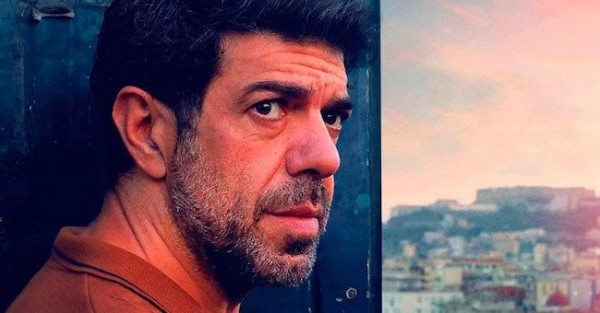
PIERFRANCESCO FAVINO IN NOSTALGIA
You can't go home again
Ermanno Rea’s last novel, published posthumously in 2016, has been brought to life on film here in a feature starring Pierfrancesco Favino, who played Tommaso Buscetta in Marco Bellocchio's 2019 Mafia "pentito" epic Il Traditore or The Traitor. This is smaller stuff in comparison, but still a haunting portrait of the filmmaker's native Naples with a blunt, shocking end, and an opportunity for Favino to be charismatic and mysterious as a man who returns to his home town, which he left at age fifteen, after forty years. This is almost like a fable, or an illustration of Thomas Wolfe's title, You Can't Go Home Again. A few of the details are a little hollow, but the whole thing is still resonant.
We first see Felice Lasco (Favino) arriving on an Egyptian plane where he is addressed in Arabic by the flight attendant, coming back to Naples for the first time after forty years abroad, to find his little, agèd mamma (the tiny but tremendous Aurora Quattrocchi), almost blind, to have a late-life reunion. There is an unforgettable scene where he carries her into a tomblike room and tenderly bathes her.
Strangely, since he has a beautiful Egyptian wife (Sofia Essaïdi) in Cairo (but no children), Felice turns out later to be planning to move back to the place he left as a teenager. Wealthy now, he immediately buys a nice apartment for his mum to replace the tiny flat a relative has moved her to, selling the nice one on an upper floor he grew up in.
This isn't the only questionable stuff that's been going on. Well, it's Naples, and not only that, but his native Sanità district, where the Catacombs are, near Capodimonte, is dominated or terrorized by what was Felice's best pal, Oreste Spasiano (Tommaso Ragno), now a crime boss known as O malommo ("The Bad Man"). As youths they carried out petty crimes together, and a murder is why young Felice left never to return. A few flashbacks in Super8 format bring back those early days and the young Feli' and Ore' (Emanuele Palumbo and Artem) in the smaller format, sunnier and brighter but with one horrible trauma.
He connects now with a priest known as Don Luigi (Francesco Di Leva), based on a real person (don Antonio Loffredo) who's like a social worker helping protect youth from crime and danger and involved with a youth orchestra and also a boxing gym. When Felice reveals his connection to Oreste aka O malommo, everyone tells him to go back to where he came from, including Raffaele (Nello Mascia), an older man who knew him whom he doesn't remember. Nonetheless against warnings, after the abrupt death of his mother, he is drawn back to his old friend, whose empire seems in decline and perhaps his health. Handsome but seedy O malommo, with his long white hair and beard, seems like an animal who is more dangerous because he is wounded.
This is tasty material, and not much has to happen because the situation becomes so constantly ominous and the city, nicely brought to life here by dp Paolo Carnera, is the other main character, beautiful, cozy (rather like Cairo but with more ornate, baroque architectural decoration), friendly, and full of menace. It's not implausible even though he's rich and happy and fluent in Arabic that a man might feel his native Napoli calling, still it's a little hard under these special circumstances to understand how Felice, who's had an apartment vandalized and a motorbike burnt to a crisp, would be so foolish, or for that matter why his pretty Cairene wife Arlette would be so into joining him to live in Naples now.
It's a dark and pretty story, a little like one by Paul Bowles. A fine return to contemporary drama for Mario Martone and another feather in the cap of the estimable and sympathetic Pierfrancesco Favino, playing the returning traveler of legend, a mystery man who's been gone so long he's forgotten the Italian word for sponge (spugno) and seems to have converted to Islam. Not perfect certainly, but great stuff nonetheless, this atmospheric film is two hours yet it feels as compact as it is tense, and there is not much fat on its bones. A good advertisement for the novels of Ermanno Rea. Recommended.
Nostalgia, 117 mins., debuted at Cannes in Competition May 2022, eight other festival showrings listed on IMDb. Breaking Glass Films has US distribution rights: in theaters from Jan. 20, 2023, VOD and on digital Feb. 21. Metacritic rating: 76%.
Also included in Open Roads: New Italian Cinema at Lincoln Center (June 1-18, 2023).
Saturday, June 3 at 5:30pm (Q&A with actor Tomasso Ragno)
-
DRY/SICCITÀ (Paolo Virzì 2022)
PAOLO VIRZÌ: DRY/SICCITÀ (2022)
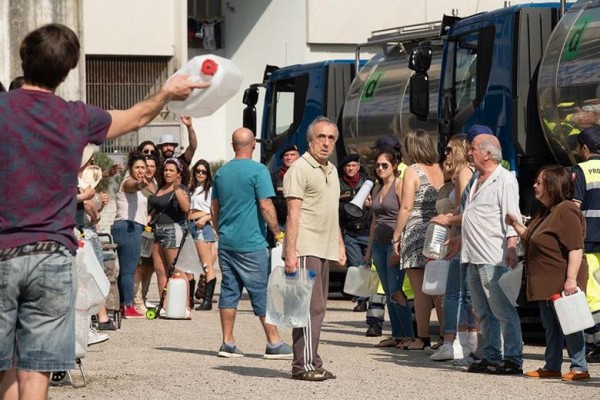
SILVIO ORLANDO (CENTER) IN DRY/SICCITÀ
Virzì's most choral film
Almost at the center of this symphonic "comedy" - if you can make a comedy about Rome running out of water - is Loris (Valerio Mastandrea), gray hair in a bun behind his head, sweaty, nervous, stressed, chauffeuring a dingy limo talking to passengers - who aren't really there. A long time ago, 2007 to be exact, I reviewed a movie starring Mastandrea, much younger of course, who was a would-be musician called Stefano. I described another character, the brother, as one who "survives on manic energy and a variety of antidepressants" and is "clearly at the end of his tether in more ways than one." How little things have changed. The brothers are members of an industrial family on the skids because their big fruit packing company is rudderless and in debt. The business "is showing huge losses," I wrote. "Everything is in hock, and the workers are owed three months' pay."
That is the sort of situation going on here, even though it's more ecological than economic. Though Rome is running out of water - which we don't really see so much; there still seems to be plenty, just not as much - the problem is aggravated by the corruption and confusion of the local bureaucrats and politicians, who are covering up and dodging the issue. I described the 2007 film as mostly made up of "mildly manic and often amusing set pieces that move us around among its multiple locations with a steady rhythm." Check. That film was Gianni Zanasi's Don't Think About It/Non pensarci. Mastandrea's job is more sedentary this time (he's 51 now, was 36 then). The "mildly manic" scenes involve other actors. Mastrandrea though, imploding in his car, is great. He expresses the disorder, the madness of the Rome of this film perhaps better than anybody else.
Virzì's problem in this film is partly that it really is a disaster film, and he doesn't know how or hasn't the means of lacks the ingenuity to convey something so expensive as the capitol of Italy running out of water. (It's actually running out all over the country, even more expensive to depict.) It's not a good sign that The Hummingbird director Francesca Archibugi wrote the screenplay here: The Hummingbird is a film quite blithe about being too complicated to follow. There's uncertainty in the conception here. It's a three-year drought. Is that so bad? Well, really, how bad is it? Bad enough so the Tiber river has dried up as CGI overhead shots of it show us. There is focus also on a possible epidemic appearing at the Policlinico. There's a fancy thermal baths owned by a Trump-like corrupt family whose mouthpiece declares to a displeased and skeptical public that the considerable amount of water it uses is obtained "privately," brought in in tanks daily. (It's not true.)
So the focus shifts to disease and to corruption and deception, not just the water supply as such. As Jonathan Romney says in his Screen Daily review, the audience is left "gasping" by all the "narrative plate-spinning." But as he also says, the whole thing will probably make more sense to the local audience, for whom many of the cast members are well-known faces. Another one is Tomasso Ragno, who plays out of work actor turned social media personality Alfredo, who polishes his online image while his wife Mila (Elena Lietti) works in a supermarket and plans to hook up on the side with a lover. Alfredo’s ex-wife Sara (Claudia Pandolfi) has something more serious to deal with: confronting the new disease. Wisdom about the relation of poverty to waterlessness is provided by young African asylum seeker Sembene (Malich Cissé). In contrast an initially sensible and knowledgable professor of hydrology (Diego Ribon) is dazzled and becomes corrupted in a single day by the fame the new crisis has brought him.
The scenes with Valerio Mastandrea in the car still remain the ones we can dig our teeth into. His scenes are matched in soulfulness, though, with those involving the popular actor Silvio Orlando as Alfredo, an aging accidentally released prisoner, now wandering around and exploring his past. Meanwhile there is a glitzy movie star featuring Monica Belluci playing a version of herself, and a cameo by Korean auteur Bong Joon-ho. Romney points out there is a lighter touch here than in Crash or 21 Grams (Yes, there is that.)
This material is still way too complicated and disjointed when introduced. But it begins to flow together and make more sense toward the last of the over two hour runtime. As various critics note, the choral effect and flow resemble Virzì's Human Capital, though the comparison is misleading because the latter is so neatly held together and provided with a satisfying outcome by a kind of murder mystery. Romney generously concludes that Dry is overall "an intelligent, ambitious modern melodrama with a bracingly cynical streak." I can still only wanly recommend it, but there are good scenes.
Dry/Siccità, 124 mins., debuted at Venice Sept.8, 2022, showing at a hanfful of other small European festivals and releasing in Italian theaters Sept. 29, 2022. Screened for this review as part of Open Roads: New Italian Cinema (June 1-8, 2023).
Friday, June 2 at 6:00pm (Q&A with actor Tomasso Ragno)
Thursday, June 8 at 3:00pm
Last edited by Chris Knipp; 05-31-2023 at 05:54 PM.
 Posting Permissions
Posting Permissions
- You may not post new threads
- You may not post replies
- You may not post attachments
- You may not edit your posts
-
Forum Rules





 Reply With Quote
Reply With Quote





Bookmarks